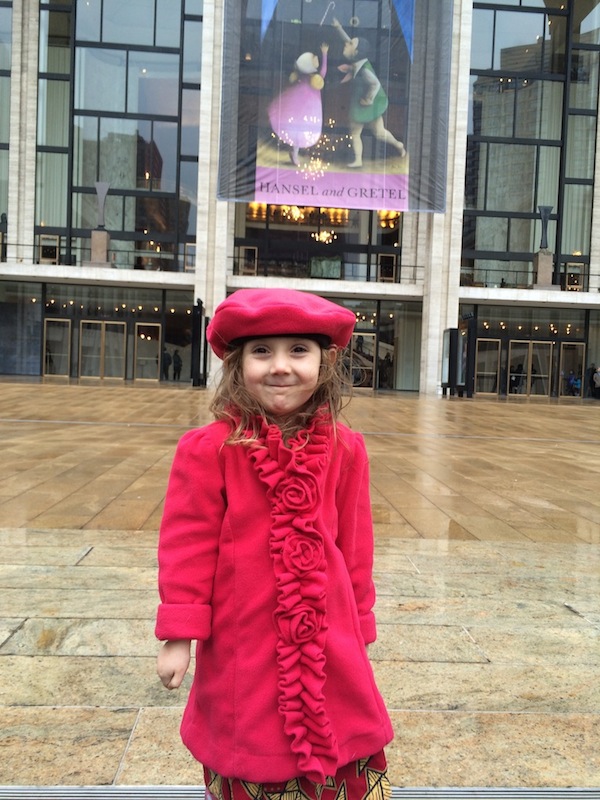Met’s “Hansel and Gretel” provides entertaining holiday feast for all ages

Sophie Grella, 4, takes her first trip to the Met for Humperdinck’s “Hansel and Gretel.” Photo: George Grella.
Long before That’s Entertainment!, there was opera. Before the movies became the most popular form of mass culture, opera was the only game in town, entertainment designed to appeal to as broad an audience as possible and, because it required great skill to produce competently, was full of high-level artifice.
That was also before classical music knew that it was, in retrospect, classical. Even after Wagner made the self-conscious push to transform opera into high art, the popular appeal and focus endured. But the idea that all classes of audiences went to see Verdi, and experienced his works standing in what we consider the orchestra section, eating, drinking and talking with each other, would cause many a contemporary administrator and board member to head to the fainting couch.
Fortunately, that’s exactly what the Metropolitan Opera cultivates when it puts on its Christmastime family productions, like Hansel and Gretel—this year’s choice, seen at a Tuesday morning performance. These are entertaining operas to begin with, and the productions are full of the sheer joy possible in telling fantastic stories through singing.
Hansel and Gretel is just what one expects, a fairy tale from the Brothers Grimm that combines hardships, scary moments, magic and triumph, all through music and singing. And it is pure fun.
This production, from Richard Jones, originally came from the Welsh National Opera and Lyric Opera of Chicago. It has been playing at the Met pretty much every other year since 2007, and seems like it will be welcome for many years to come, because the clarity, narrative intelligence and sheer beauty are timeless qualities.
Jones, the cast, and conductor Sir Andrew Davis do everything right. The experience is professionally smooth and polished but not indifferent, there’s the sensation that all involved enjoy doing this, and doing it well.
Mezzo-soprano Christine Rice and soprano Aleksandra Kurzak are the leads, and they clearly appreciate the chance to be, well, childish on the operatic stage. They express the impatience, self-involvement and wonderment of the characters without condescending to the roles or pandering to the audience.
And the audience includes a large proportion of children, some dozing but most—snacking unselfconsciously—whisper questions and remarks to their parents. Most, if not all, are familiar with the story. The libretto is the English translation from David Pountney, and the gist is clear enough for everyone.
A particular four-and-one-third-year old in attendance at her first opera waited patiently through the first act, set inside Hansel and Gretel’s drab, tiny hovel. The act is expository, introducing the children and the hunger that drives them into the woods. Their parents—baritone Dwayne Croft (excellent) and mezzo Michaela Martens, heard last month as Marilyn Klinghoffer—also show up, probably to appeal to the adults in the audience, since they are mere accessories.
The meat of the story, and of the production, shows up in Act II, with Hansel and Gretel lost in the woods, and from that point on everything is a complete wonder, borrowing equally from surrealism and Maurice Sendak. The trees are dressed in suits, the Sandman (soprano Carolyn Sproule) puts the children to sleep, and into their dreams come a platoon of gentle-monster chefs, carrying a feast. Serving the table is a fish, dressed in black tie and tails. To a little girl in attendance, this was her second-favorite part.
Awake, they are enticed into the Witch’s kitchen by a giant cake carried on a giant tongue. The Witch—tenor Robert Brubaker, who is lively without campiness—is first heard from the pit, and has the youngsters eagerly anticipating her appearance. Inside her industrial-style kitchen, she is surrounded by bread in the shape of the children she had previously captured. She dances around, gleeful at the thought of her dinner, and tries to fatten up Hansel with the most horrible smoothie one can imagine.
The climax, and the favorite part for not only one child but all the kids, is when Hansel and Gretel shove the Witch into her own oven—it set off cheers and applause. With her spells gone, all the children return to life in a lovely chorus that had an enchanting effect.
Davis led a smooth, musical performance. Humperdinck’s Wagner-Lite style has enough rhetoric to charm the ear while laying out a predictable sense of form to satisfy veteran and neophyte alike.
Was it perfect? No, but criticism of the singing is besides the point. Any flaws are momentary and are so quickly subsumed by the overall pleasure of the experience that they are easily forgotten. There was a technical mishap when the speakers produced a couple moments of harsh feedback (there is some sound enhancement in this staging) but it’s hard to imagine that as anything other than a unique glitch.
In the end, the rapturous applause of a thousand tiny hands can’t be wrong.
Hansel and Gretel plays through January 8, Heidi Stober replaces Aleksandra Kurzak January 1, Andriana Churchman replaces Stober and Jennifer Johnson Cano replaces Christine Rice January 8 metopera.org